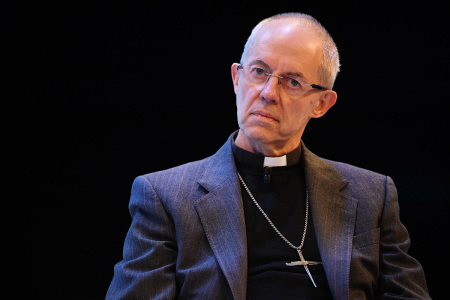Church of England: Gay couples can't marry but will receive 'God's blessing'

The Church of England has announced its support for a proposal that will allow congregations to bless same-sex unions but maintain a traditional definition of marriage.
A statement released by the denomination Wednesday announced plans for bishops to propose “prayers of thanksgiving, dedication and for God’s blessing for same-sex couples” as well as to “urge all congregations in their care to welcome same-sex couples unreservedly and joyfully.”
As rumored in recent days, the proposals — crafted following what officials say was six years of “listening” as part of its Living in Love and Faith initiative — are expected to be provided to the CofE’s General Synod next month in London.
The Archbishop of Canterbury Justin Welby said, "I am under no illusions that what we are proposing today will appear to go too far for some and not nearly far enough for others, but it is my hope that what we have agreed will be received in a spirit of generosity, seeking the common good."
While additional details were not immediately announced, the recommendations will provide the “fullest possible pastoral provision” for same-sex couples “without changing the Church’s doctrine of Holy Matrimony.”
According to the statement, the formal teaching of the CofE that marriage is between “one man and one woman for life … would not change.”
While same-sex couples would still be unable to marry in a CofE church, they would be allowed to “have a service in which there would be prayers of dedication, thanksgiving or for God’s blessing on the couple in church following a civil marriage or partnership.”
The plans include a number of prayers which bishops could use “voluntarily” to sanction same-sex couples “who have marked a significant stage of their relationship such as a civil marriage or civil partnership.”
Known as Prayers of Love and Faith, the prayers would be part of reflecting the denomination's “theological diversity,” according to the statement. Following the debate at Synod, the House of Bishops will then refine the prayers and then commend them for use, officials said.
The prayers would be voluntary for clergy and could be used in different combinations to reflect what officials called the "theological diversity" of the CofE.
Citing 1 John 4:16, which reads, “God is love, and those who abide in love abide in God, and God abides in them,” the statement said in part: “For the first time, under historic plans outlined today, same-sex couples will be able to come to church to give thanks for their civil marriage or civil partnership and receive God’s blessing.”
In addition to the report, CofE bishops are expected to publish a letter of apology to LGBT people, which will “speak honestly about their ongoing disagreements over the possibility of changing the Church’s teaching on marriage itself.”
However, the letter will also “[emphasize] a clear and strong desire to continue to ‘walk together’ amid their differences.”
Full details about the proposal are expected to be published Friday, while the Synod is expected to take up the debate Feb. 8.
Sarah Mullally, the bishop of London and chair of the group of bishops tasked with forming the proposal, acknowledged in the statement that the process “has been costly and painful for many on all sides.”
“We have been moved by what we have heard and seen,” she said. “And what has come through very clearly, even though there continues to be disagreement among the bishops and among the wider church on these questions, is a strong desire to continue to share our life together in Christ with all our differences.”
The Archbishop of York Stephen Cottrell said the proposals were informed by what he said were multiple examples of “rejection, exclusion and hostility” toward LGBT-identified people in the CofE.
“Both personally and on behalf of my fellow bishops I would like to express our deep sorrow and grief at the way [LGBT] people and those they love have been treated by the Church which, most of all, ought to recognize everyone as precious and created in the image of God,” he said.
“We are deeply sorry and ashamed and want to take this opportunity to begin again in the spirit of repentance which our faith teaches us.”
The announcement comes after Penny Mordaunt, the leader of the British House of Commons, urged the Church of England to change its doctrinal teaching on same-sex marriage earlier this week.
Mordaunt tweeted an image of a letter Monday in which she called on her local bishop to “back reform” and permit parishes and clergy to “conduct weddings for same-sex couples or, at a minimum, enable authorized blessings.”
The lawmaker's comments combined with Parliament’s announcement earlier this month that lawmakers are drafting a bill to ban efforts to eliminate or reduce same-sex attraction in homosexuals — often derisively referred to as “conversion therapy” — in England and Wales, could indicate a further shift in how the British government interacts with churches.
Andrea Williams, chief executive of Christian Concern and former lay member of the General Synod, said in a statement on Wednesday the apology could also prove to be a “turning point” and signal the decline of the CofE.
“Christianity teaches that sexual expression is reserved for marriage between one man and one woman. Any other form of sexual relationships are sexually immoral,” Williams said.
"The Bible calls it sin. The Church of England is now encouraging the celebration of sexual immorality,” she added. “Let’s be clear this is a critical moment and will go down in history as a turning point in the decline and fall of the Church of England…unless these proposals can be decisively resisted by the faithful in Synod.”
Ian M. Giatti is a reporter for The Christian Post. He can be reached at: ian.giatti@christianpost.com.





















